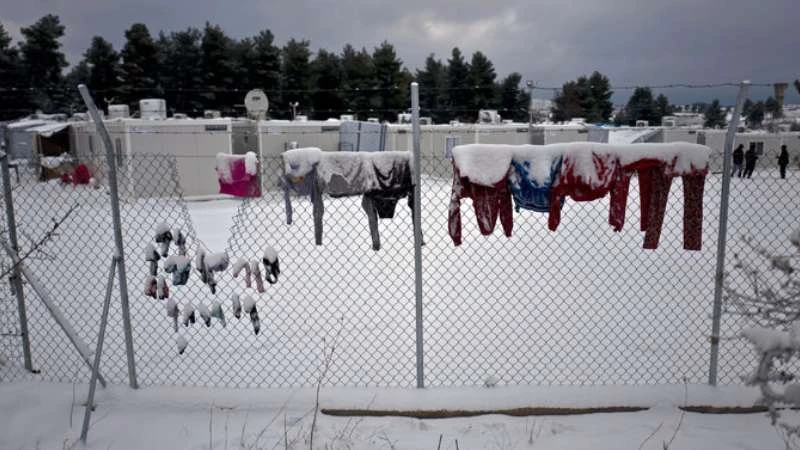An arctic blast that has reached as far south as the Mediterranean is generating perilous conditions for thousands of refugees in overcrowded migrant camps in Greece and prompting the European Union to declare the situation “untenable.”
On Wednesday, a Greek navy ship docked at Lesbos island to take on as many as 500 refugees. They have been struggling to survive the subzero temperatures in the severely overcrowded main camp in Moria, using pup tents that were supposed to be temporary when they were set up last year in warmer weather.
Video and photos taken by migrants inside the camp and posted to social media showed flimsy shelters sagging under a blanket of snow, and people waiting in long lines in the falling snow for food and to use bathrooms.
In one video, a man identifying himself as a migrant shows people lifting the flaps of snow-covered tents near a slushy pathway. “Look at how human beings are living,” said the man, speaking French.
Imploring officials of the European Union to look at the situation themselves, he said: “Why can’t people leave here? How is it possible to live in these conditions, my God?”
On Tuesday night, the snow turned to freezing rain, forming rivers of muck around the camp and drenching tents and clothing, aid organizations reported. On Samos, another island where the main migrant camp is overflowing, refugees reported freezing conditions with no heat.
At refugee camps on the Greek mainland, and especially near the northern border, migrants continued to grapple with living outside under heavy snowfall.
“This is unbearable,” said Roland Schoenbauer, a spokesman for the United Nations high commissioner for refugees, who said he was receiving reports from doctors in camps across Greece warning of rising health risks from the cold and humidity. “It shows what happens when you try to squeeze too many people into these camps. You can’t stockpile human beings.”
A year after the European Union sealed its borders to large numbers of newcomers, Greece remains Europe’s holding pen for nearly 60,000 men, women and children. Many have been living for months in a distressing limbo in sordid refugee camps on the mainland and on Greek islands near Turkey, unable to move to countries where they hoped to seek asylum, and with no means or motivation to return to Syria, Iraq or other countries from which they fled war or economic hardship.
Eric Kempson, a British citizen who has been living on Lesbos for over a decade, has been documenting the deteriorating conditions in the Moria refugee camp, posting videos of tents collapsing under the weight of snow and migrants slogging through muddy walkways.
“It is now heavy rain and melting snow, which is causing flooding in the camp,” Mr. Kempson wrote to The New York Times, via Facebook, describing the conditions in the camp on Wednesday. “It’s like we begin the vicious circle again and nothing gets better, only worse.”
On Monday, the European Commission issued a statement saying the Greek refugee situation was the responsibility of Greek authorities. “The situation has become untenable,” a spokeswoman, Natasha Bertaud, said in Brussels.
The United Nations refugee agency and other aid groups have been working to move migrants from camps into better shelters, including hotels. In some cases, however, they have met resistance: Hotel owners on Samos, for example, were generally refusing to house migrants, Mr. Schoenbauer said.
But a bigger problem is the extremely slow processing of asylum applications for those in the Greek camps. While the numbers of people streaming across the Aegean Sea from Turkey have slowed to a trickle after Turkey and the European Union signed a deal to resolve the crisis last March, thousands of migrants have yet to be registered for asylum.
That is partly because the European Union has sent just a fraction of the assistance it pledged to Greece last year to help clear the backlog.
A separate European Union plan to ease Greece’s burden by relocating tens of thousands of asylum seekers has also failed to take off, with European countries taking only a few thousand of the many stuck in Greece.
The bottlenecks have overwhelmed many of the camps, especially on the Greek islands, where migrants arriving after the March deal are supposed to be held until being deported to Turkey.
The camp at Moria, for instance, run by the Greek police and nongovernmental organizations and designed for about 3,000 people, was reinforced with small container shelters that can each house up to 30 people.
But hundreds of makeshift tents have been set up outside for months to accommodate an overflow of asylum seekers — first under the beating Greek sun, and now under the pelting snow and rain.
“The snow is only the tip of the iceberg,” Mr. Schoenbauer said. “The bigger problem is the overcrowding of the islands, and one reason for the overcrowding is the fact that the asylum procedure remains far too slow.”



التعليقات (0)